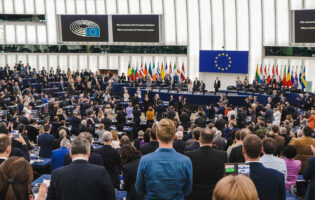“Eine Stimme über Europa – und ihre innenpolitischen Konsequenzen”
On the 29th of September, all of Europe will be looking towards Berlin. On that day, the German Federal Parliament will vote on a further increase of around 750 billion Euros for the provisional Euro safety mechanism known the European Financial Stability Facility (EFSF). The financial assistance is once again aimed at benefiting a nearly bankrupt Greece. However, unlike the other three votes that have taken place since May 2010, there is a serious danger of not obtaining a Parliamentary majority. This danger arises from the fact that numerous members of the Black-Yellow governing coalition have already announced their refusal to agree with this law. How has such a rebellion within the governing coalition against the crisis management of its own Federal government come to be?
On the one hand, the rather unusual refusal of party discipline by some delegates represents the growing doubts within Germany’s parliamentary system of government over the effectiveness of Europe’s financial safety-net politics, as well as the general rise in Euro-skepticism among the German population. On the other hand, it represents the widespread discontent with the leadership of Chancellor Angela Merkel and Vice Chancellor Philipp Rösler, both of whom are the chairmen of their respective parties. Here, the criticism lies not only with the content of the law itself (policy), but also with the sequence of primarily leadership-oriented decision making (policy). Thus, the Parliamentarians have too often simply expected that those in the German Bundestag would simply, and without criticism, support what the tandem of Angela Merkel and French President Nicolas Sarkozy had informally agreed upon.
Although some well-known members of the Christian Democratic Union have already publicly announced their intention to vote ‘No’ on the increase, the CDU’s coalition partner, the Free Democratic Party (FDP), faces even more unrest following their numerous humiliating defeats in a string of state elections that have threatened the party’s very existence. The former financial speaker of the FDP, Frank Schäffler, who has voted ‘No’ in every vote for financial assistance to the Euro, has spent the past several months fighting against the leadership of the FDP and its parliamentary group. In the first of the three votes since May 2010, Schäffler was the only FDP member to vote against the measure. However, with each subsequent vote, the number of Liberals voting against financial help has grown. Since then, Schäffler has founded a grass-roots campaign known as the “Liberaler Aufbruch (Liberal Rise),” which promotes a platform with Libertarian Programs, such as a refusal of any financial measures that support banks and states and skepticism over the necessity of increased climate protection. The leaders of the FDP initially underestimated the effects of this “German Tea Party” on the entire party. However, nearly one third of all delegates in the FDP Congress are now supportive of the programs put forth by the “Liberaler Aufbruch.” Furthermore, this Fall Schäffler will push for member vote within the FDP on the Euro Stability Mechanism (ESM), which is scheduled to take effect in 2013. This vote could be very unpleasant for the leaders of the FDP, because it can be very difficult to predict how the members of the party think and how they will vote on such a complex issue. For example, the last FDP member vote in the middle of the 1990s over the widespread wiretapping taking place in Germany led to the eventual resignation of the then liberal Minister of Justice.
If Merkel and Rösler cannot convince the critics within their respective parties and, therefore, not obtain a majority vote for the renewed Euro financial mechanism, then the future of the CDU-FDP coalition is in serious danger. However, there is essentially no real threat for Europe, as parts of the opposition parties will still vote yes on the increase. Nevertheless, it will still be seen as a loss for the governing coalition if they can only pass their own measure with the support of the opposition.
In test votes on the measure taken within the CDU/CSU and FDP parties at the beginning of September, 14 ‘No’ were counted; with only 19 more coalition members than opposition members in the Parliament, a majority vote is not yet guaranteed. To this result, Angela Merkel announced that this vote should not be seen as a vote of confidence in her Chancellorship – as was the case with preceding Chancellor Gerhard Schröder and the decision to send troops to Afghanistan in 2001. If the vote is not taken as vote of confidence, then this slight majority in favor of the measure would still be enough to pass it without the opposition. Nevertheless, the leaders of the opposition – Sigmar Gabriel (SPD), Jürgen Trittin (Bundnis 90/Die Grünen), and Gregor Gysi (Die Linke) – will continue their push for a new national election if the Chancellor majority vote (50% of all Bundestag members plus one vote) is not reached by all members of the governing coalition. The vote over the renewed expansion of the EFSF may not only have consequences for Europe as a whole, but it may also lead to direct changes Germany’s domestic political landscape.
Jan Treibel is currently a NRW School of Governance/AGI Fellow.
This essay appeared in the September 22, 2011, AGI Advisor.









